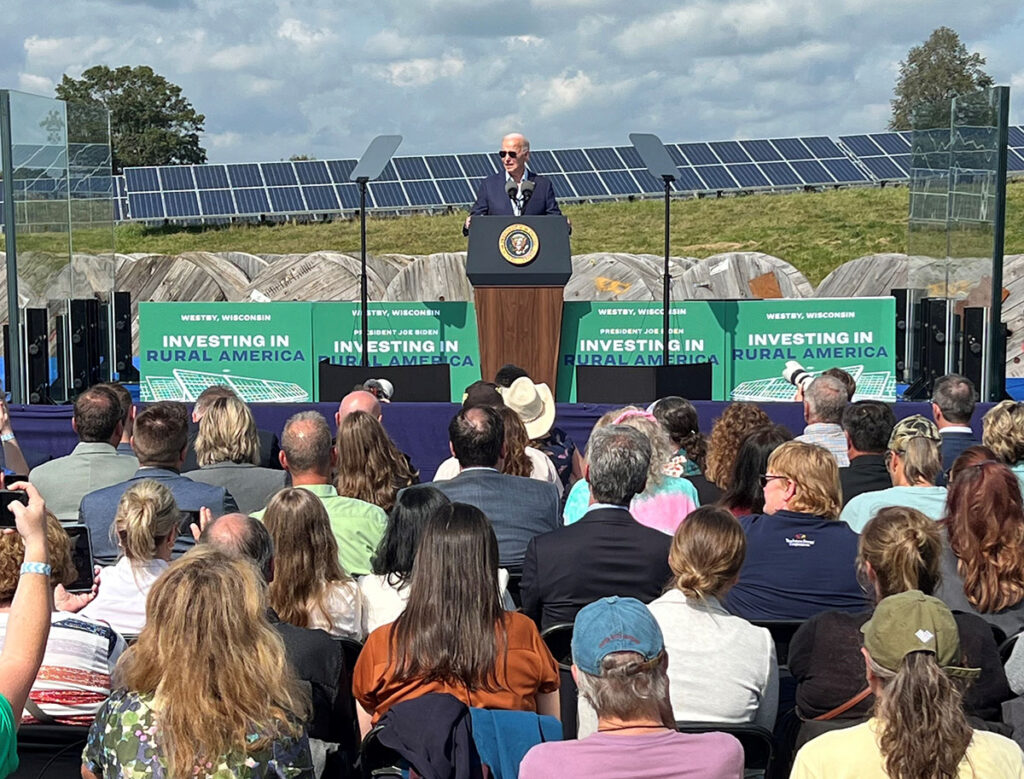
Sixteen electric cooperatives from throughout the nation have been selected for more than $7.3 billion in grants and loans from the U.S. Department of Agriculture’s New ERA program to finance new and innovative clean energy systems, federal officials announced Thursday.
The first co-op to be chosen was Dairyland Power Cooperative in La Crosse, Wisconsin, which has been awarded $579 million to purchase solar and wind power, putting the co-op on track to slash its carbon emissions by over 70% by 2031.
The funding—secured by NRECA in the Inflation Reduction Act—will make it much faster and more affordable for Dairyland to transition to a cleaner energy future, said Brent Ridge, the generation and transmission co-op’s president and CEO.
Dairyland hosted President Joe Biden, Agriculture Secretary Tom Vilsack, Rural Utilities Service Administrator Andy Berke and NRECA CEO Jim Matheson at Vernon Electric Cooperative in Westby, Wisconsin, on Thursday afternoon to make the announcement. Vernon EC is one of Dairyland’s member co-ops.
“If we look at what we were able to accomplish prior to receiving New ERA funding, it was similar to driving 20 mph on a country road versus getting on the interstate going 70,” Ridge said in an interview.
The 16 co-ops selected for funding will leverage private investments of more than $29 billion to build more than 10 gigawatts of clean energy for rural communities across the country and will reduce and avoid at least 43.7 million tons of greenhouse gases annually, the USDA said. That’s equivalent to taking more than 10 million cars off the road each year, the agency said.
Dairyland Power had set a goal of reducing its carbon emissions 50% by 2030, but it will now be able to achieve a reduction of at least 70% by 2031, he said.

And it can keep consumer rates down in the process while also creating new job opportunities in the region by attracting large manufacturers and data centers looking for affordable rates and sustainable power, Ridge said.
“It’s a win-win-win,” he said. “It’s good for Dairyland members, the environment and the economy of rural communities.”
New ERA—short for Empowering Rural America—is a $9.7 billion voluntary program created exclusively for co-ops after strong lobbying by NRECA, which convinced Congress to include it in the IRA in 2022.
The program proved popular with co-ops, which flooded the USDA with requests for funding. New ERA provides grants and loans to co-ops for new and innovative clean energy systems, including carbon capture, energy storage, renewables, nuclear energy and generation and transmission efficiency.
“The New ERA program showcases what is possible when the government prioritizes voluntary, flexible decision-making and allows electric co-ops to take a tailored approach to respond to local needs,” said Matheson. “It is a transformative opportunity for electric cooperatives.”
Dairyland Power, which serves 24 distribution co-ops and 27 municipal utilities, currently gets 37% of its power from coal, 39% from natural gas, 16% from wind and solar, 6% from other renewables and 2% from other sources. By 2031, renewables will rise to be around 50% of the co-op’s resource mix, Ridge said, and coal will be less than 25%.
The New ERA funding will also allow the co-op to refinance its coal assets at very low interest rates to pay them off, he said.
Dairyland Power will contract with developers through power purchase agreements to acquire 593 megawatts from four wind installations, 427 MW from four solar installations and 60 MW of battery energy storage—enough renewable energy to power 240,000 homes.
The co-op is still negotiating with developers in the four states it serves to finalize those deals. Some of the installations already exist while others are emerging, Ridge said.
Two more rounds of New ERA funding will be announced in the months to come. In addition to Dairyland Power, the co-ops selected for this first round of funding are:
- Allegheny Electric Cooperative Inc., Pennsylvania and New Jersey
- Arizona Electric Power Cooperative Inc., Arizona, California, Nevada and New Mexico
- Basin Electric Power Cooperative, Montana, North Dakota and South Dakota
- Buckeye Power Inc., Ohio
- CORE Electric Cooperative, Colorado
- East Kentucky Power Cooperative, Kentucky
- Golden Valley Electric Association, Alaska
- Great River Energy, Minnesota, North Dakota and Wisconsin
- Hoosier Energy, Indiana and Michigan
- Minnkota Power Cooperative, North Dakota and Minnesota
- San Miguel Electric Cooperative Inc., Texas
- Seminole Electric Cooperative Inc., Florida
- Tri-State Generation and Transmission Association Inc., Colorado, New Mexico, Nebraska and Wyoming
- United Power, Colorado
- Wolverine Power Supply Cooperative, Michigan
Erin Kelly is a staff writer for NRECA.